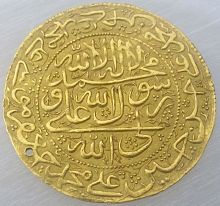171 - Golden Ages: The Later Eastern Traditions
An introduction to later developments in philosophical theology, sufism, and Illuminationism, focusing on the reception and critique of Avicenna.
Themes:
• A. Al Ghouz (eds), Islamic Philosophy from the 12th till the 14th Century (Bonn: 2018).
• W.C. Chittick, The Heart of Islamic Philosophy: the Quest for Self-Knowledge in the Teachings of Afḍal al-Dīn Kāshānī (Oxford: 2001).
• G. Endress, “Reading Avicenna in the Madrasa: Intellectual Genealogies and Chains of Transmission of Philosophy and the Sciences in the Islamic East,” in J.E. Montgomery (ed.), Arabic Theology, Arabic Philosophy: From the Many to the One (Leuven: 2006), 371-422.
• D. Gutas, “The Heritage of Avicenna: the Golden Age of Arabic Philosophy, 900-ca.1350,” in J. Janssens and D. De Smet (eds), Avicenna and his Heritage (Leuven: 2002).
• W. Madelung and T. Mayer (trans.), Struggling with the Philosopher: a Refutation of Avicenna’s Metaphysics (London: 2001).
• G. Makdisi, The Rise of Colleges: Institutions of Learning in Islam and the West (Edinburgh: 1981).






Comments
Science in Islam
Hi Professsor Adamson, I was intrigued by your comments refuting Richard Dawkins. I have to confess I believed the same falicy, namely that Islamic science fell into decline after about the 1300s. Now, I think I know that science in the Islamic world is doing poorly currently. When would you say that the decline of science occured; perhaps the colonial period? I'd love to learn more. Thanks.
In reply to Science in Islam by Thomas
Science in Islam
I think probably the answer to this is not anything particular about Islam, it's more about the fact that something unique and unprecedented happened in Europe, namely the "scientific revolution" (to use a term that I will no doubt wind up saying is far too simplistic later on). We don't see that happening in the Islamic world, China, etc. So I think the explanation is not so much "what went wrong elsewhere?" as "what went right in Europe?" In the Islamic world we see a remarkable degree of continuity from the "classical period" down to very recent times - as we'll be seeing, they keep working within the framework of Avicennan philosophy right up until the 19th century. (This is one reason it is so odd to compliment Islamic achievements of the middle ages and imply there was a massive decline after: if anything, we see a high degree of continuity, as would have happened in Europe if scholasticism hadn't been supplanted by the developments in early modern Europe.)
Of course if we go forward to the 19th and 20th centuries yes, we also have to factor in colonialism as well. But there you probably need a historian of modern politics rather than a historian of philosophy to really explain what has happened in the last 200 years.
In reply to Science in Islam by Peter Adamson
Science in Islam
Thanks. One of the topics I really enjoy in your podcasts are when you delve into the development of science and math.
Influence of Sufism
Hi Peter,
thank you for this - I have been lectured at by people from the Western intellectual tradition that Islamic Science and Philosophy went into steep decline after an specified high point. However, these are often people who push the myth of the "Dark Ages" - again a loosely specified period that ended in the 11th Century or the 17th Century, depending on who you ask. They also have not heard of Johanes Scottus Erigunia or if they have, they are hazy on his intellectual formation.
One of the interesting artefacts from this period is a letter written in 1290 by Arghun Khan to Pope Nicholas IV which refers to a discussion of the validity of Christian baptism among Nestorian Christian Mongol communities. (The Khan did not show his characteristic wisdom in trying to deal with Philip IV of France.)
This letter shows that there is a Philosophical sophistication among nomadic people. To be facetious, they must have a had a good grasp of Political Philosophy to keep an empire running for many years - that it was Ivan I who finally freed Russia from Mongol suzerainty in 1480.
As far as the influence of Sufism goes - it runs very deep, more than being fashionable in California in the 1990s. One thing that is interesting is that the Sufi Brotherhoods provided a point of focus for dissidents in the Caucasuses and Central Asia during the Soviet period. There is a bit of discussion of this in: Christopher Andrew and Vasili Mitrokhin, The Mitrokhin Archive II, Allen Lane, 2005.
I can't imagine the Sufi tradition placing Neo-Platonism in epoxy or glass, preserving it in a fixed state.
Centre of Talmudic Studies
Hi Peter,
one thing that I did forget was that from an early point, there was a Talmudic school based in Bagdad, surrounded by a vibrant Jewish community until political events of the 20th took over and deprived Bagdad of this ancient community.
Until the 20th Century this was the place for Talmudic studies, which was generally done in Aramaic.
The presence of this centre of scholarship is one of the most telling features to indicate that the Islamic world did not go into a steep decline.
Also in Bagdad and Mossul there was an active Christian community - generally referred to as Chaldean Christians, who were active in Philosophical pursuits.
al-Shahrastani
Hi Peter,
I'm just catching up on some of your recent podcasts here. I'm curious, what do you make of the argument by some that al-Shahrastani may have been an Ismaili? I noticed that in this episode you only mention his 'Ashari connections. Thanks for your input. I've really enjoyed your work.
In reply to al-Shahrastani by Daniel Beben
Shahrastani an Ismaili?
There's a useful discussion of this in the Madelung/Mayer translation of "Struggling with the Philosopher" on page 2 and following; to summarize, there are several works by him that may show Ismaili leanings but none of his contemporaries call him an Ismaili.They conclude that "in spite of his basic espousal of traditional Ismaili teaching he was not prepared to join them in their seclusion." But it sounds like he was at the very least shiite in his inclinations.
Hi Peter,
Hi Peter,
In regards to the notion of post-Mongol or even post-Ghazali decline, I'm wondering what your thoughts are on the role of specialists in broader Islamic history its continued survival. I ask this because yesterday I had a lecture in a class on early Islamic history focusing on the emergence of theological, philosophical and mystical traditions in Islam, where he did claim there was a decline after Al-Ghazali in the Sunni world. When I pressed him on this after the class it seemed apparent to me that his understanding of 'philosophy' really is as something equivalent to falsafa. For instance, he seemed quite surprised when I claimed that I and most other philosophers find Al-Ghazali's analysis of cause much more interesting than Avicenna's or Al-Farabi's. After hearing this, the thought came to my mind that people who don't know much about or aren't particularly interested in contemporary philosophy might be inclined to equate it with falsafa, and hence write histories concluding that philosophy disappeared - which it did, on their understanding of it.
Is this an actual phenomenon, or am I just reading too much into a single conversation I've had?
In reply to Hi Peter, by Jack
An actual phenomenon
No, that is very much an actual phenomenon. There are actually two problems here: one is that any reasonably broad minded person will be willing to see some texts and authors as "philosophical" even though they were not examples of falsafa, with Ghazali being a prime example. The other is that even falsafa (which, after Avicenna, mostly means Avicennist philosophy) lived on more than people realize. So when people say that philosophy met its demise in the 12th century or so in the Islamic world, they are actually making two mistakes, one a mistake of narrow-mindedness, the other a historical mistake. And your encounter is typical, as these two mistakes shaped most literature on the field until very recently so it is going to take a while to get the message out. Thanks for helping!
End of Latin Translations?
Hello Prof. Adamson,
First of all thanks for this podcast. It has been a great journey to follow you through this far and I can only imagine the rest. Before listening it, I too had the belief that al-Ghazali basically single handedly finished philosophy in Islamic world. Thank you for destroying this false belief.
I had a thought about this belief by the way. Is the Arabic-Latin translation studies continue after the 13th century? Can it be that Ghazali (and Ibn Rushd after him) are some of the last Islamic writers that were translated into Latin and thus the last thinkers that affected the Europeans? If that is the case, what is the reason for this? Did they started to think they have come to a point where they did not need the translations any more?
On a second thought, was this information exchange one way? Was there any Arabic translations of the works written in Latin? If not, why?
Thanks again for the podcast, and sorry for asking too many questions.
In reply to End of Latin Translations? by Can
End of translations
"Can it be that Ghazali (and Ibn Rushd after him) are some of the last Islamic writers that were translated into Latin and thus the last thinkers that affected the Europeans?"
Yes, that's exactly it: this causes the "optical illusion" that philosophy in the Islamic world ended with Averroes: almost nothing after him was translated. The reason for this, I think, is that they turned to the Arabic sources in order to understand Aristotle better and by the early-mid 13th century felt that they had enough sources and also their access to Aristotle himself improved, through translations from Greek. Basically, the moment for Arabic-Latin translation passed.
There were no Latin-Arabic translations as far as I know. I think the reason is pretty obvious: the Latin world was way behind them in the medieval period in almost all respects, and by the time the Latins got going with sophisticated Aristotelian commentary and related thought, the Islamic world no longer cared much about Aristotle and had moved on to Avicenna.
Having said that, in both cases I think we should also bear in mind that translation is not, as it were, the default. All the translation movements (Greek-Arabic, Arabic-Latin, Greek-Latin) had very specific motives and were sponsored by powerful and rich agents who were able to draw on a community of scholars with the relevant linguistic and intellectual skills. Unless that perfect situation arises, cultures just develop independently in their different languages. So in general we don't need to ask why translation did NOT happen, since that is the norm, but why it did happen on the rare and remarkable occasions when it did. (This is like asking "why was their no Enlightenment in the Islamic world/India/China etc?": as if the Enlightenment is just supposed to happen, and we have to explain why it failed to occur in places other than Europe, rather than seeing it as a unique and remarkable event that emerged from the specific situation in Europe in the 17th c.)
Add new comment